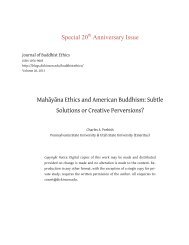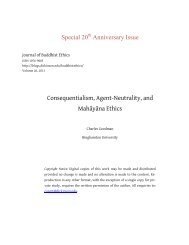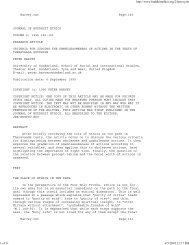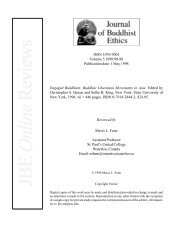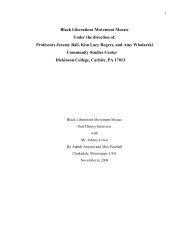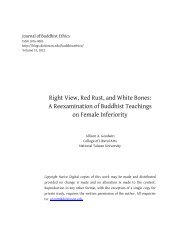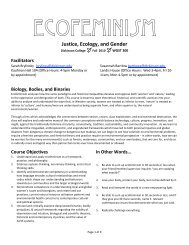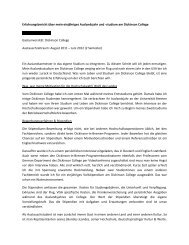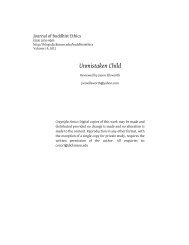Read article - Dickinson Blogs
Read article - Dickinson Blogs
Read article - Dickinson Blogs
You also want an ePaper? Increase the reach of your titles
YUMPU automatically turns print PDFs into web optimized ePapers that Google loves.
Barstow, Between Abstinence and Indulgence 86<br />
sonal responses to animals suffering, however, as well as the extreme im-<br />
portance he attached to experiences that arose through animal compassion,<br />
demonstrate a level of concern with animal welfare that is unusual among<br />
Tibetan lamas. Indeed, as Khenpo Ngawang Pelzang demonstrates, Jigmé<br />
Lingpa’s spiritual heirs understood him to be particularly focused on com-<br />
passion towards animals, contrasting his approach with ones promoted by<br />
other figures.<br />
Given the strength and consistency of Jigmé Lingpa’s concern for<br />
animals, it should not be surprising to find that several of his works are<br />
strongly critical of eating meat. In a short poetic work of religious advice,<br />
The Well-Grounded Rabbit, he declares, “Because meat is sinful food,<br />
think of it with deathly fear” (772). 18<br />
In articulating this critique of meat eating, Jigmé Lingpa relies on<br />
the importance which Tibetan Buddhism, as a part of the Mahāyāna, plac-<br />
es on compassion. This point is made in the Chariot of the Two Truths,<br />
where, in the course of an extended discourse on the flaws of meat, he re-<br />
flects, “Rather than some other system, where one pretends to be a follow-<br />
er of the Mahāyāna, but actually seeks only to eat meat and drink alco-<br />
hol, 19 those who follow after our Teacher [the Buddha’s] great heart-<br />
teaching seek only to save the lives of beings” (349). 20 As this passage<br />
makes clear, Jigmé Lingpa sees both meat and alcohol as incompatible<br />
with Mahāyāna practice.<br />
Gyelwé Nyügu (‘jigs med rgyal ba’i myu gu, 1765-1842) is said to have had a profound ex-<br />
perience sparked by the sight of a sheep being slaughtered for him (mkhan po ngag<br />
dbang dpal bzang Autobiography 80).<br />
18 sha ni sdig pa’i zas yin pas/ gsad pa’i ‘jigs pa dran par bya/<br />
19 As a sinful object of consumption, alcohol is often critiqued alongside meat in Jigmé<br />
Lingpa’s works, as well as the writings of other Tibetan lamas.<br />
20 theg pa chen po'i gang zag tu khas 'ches nas sha chang gi bza' btung 'ba' zhig don du gnyer ba<br />
ni lugs gzhan pa zhig las bdag cag gi ston pa thugs sde chen po dang ldan pa de'i rjes su zhugs pa<br />
rnams kyis ni sems can gyi srog skyob pa 'ba' zhig dang du blang zhing/



